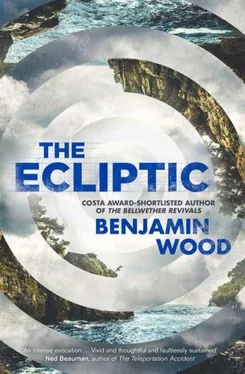‘Because I feel it in here.’ (Tapping his heart.)
He insists that there has to be a way to escape the ship. The woman tells him that the furthest she has ever reached is F Deck, and she has no intention of ever going back there. ‘I’m richer here than I ever was on land,’ she says. ‘Look at this garb. It’s best Russian mink.’ The air between decks, she warns, is poisonous and cannot be breathed. ‘But I can show you a good way to get to F Deck, if you’ll put the gun down.’ In a trunk, she has some breathing apparatus: a deep-sea diving mask attached to an oxygen tank, marked: ST ANA’S HOSPITAL. She leads him to a hatchway, sealed with candlewax. He thanks her, gives her back the pistol. ‘Oh, I think you’re going to need that more than I will,’ she says. ‘Godspeed to you. But don’t ever come back here.’ She lets him go and shuts the door behind him.
The hatchway opens to a narrow metal stairwell. The climb is sheer and he withers after the first flight, slouching, crumpling. There are more steps than he has ever seen (this thought shown in bold for emphasis). He breaks through the F Deck hatch and collapses, hitting his head. The loudspeaker again: Notice for stewards in cabin class: the purser’s office is now closed. Thank you.
Issue 3 — E Deck
AT COORDINATES UNKNOWN. . A leap ahead in the narrative. Irfan Tol, fourth engineer, is still in his overalls. He is straddling the steel-mesh walls of a baggage lift. He cannot put his feet down because there is no floor beneath him — it appears to have eroded and there is nothing but a very deep shaft underneath. The lift is going nowhere. His face is knotted and tense. He scrambles to the other side, falling into a room crammed with suitcases (replicas of the one he found in the first issue). Hurriedly, he empties them, gathering provisions: a first aid kit, a torch, a carpetbag, a tape recorder, a bottle of gin. He encounters a trunk with a military emblem, tries to open it with a little key (from Issue 1?) and it comes loose. Inside: sticks of dynamite, a gas mask, and a thermos flask. He opens it and dry ice steams out. Goddamn. Everything is stowed inside the holdall, and he keeps on going, through the next hatch. Now where is he? Behind a pane of window glass, looking down upon a swimming pool. The water is stagnant and brown. He sniffs, getting an acrid stench, so puts the gas mask on.
Coming down the steps, he treads carefully on the poolside. Flies buzz all around him. The tiles are dabbed with animal excrement. He sees a bootprint in it — not his own — and feels a presence near by. (In slanted letters: Something’s here. . and then a full page of wide panels showing various aspects of the room, but no people.) Crouching by the diving board, he spots a shape quivering at the bottom of the pool. The water is too rotten to see through (shown as though from the gaze of his steamed-up gas mask). Excrement floats on the surface. Getting up from his haunches, he is startled. What the—? Alsatian dogs are running for him in a pack. He cannot move quickly enough, and they send him toppling into the filthy dark pool with a splash! that takes up half a page.
(Dark brown colouring to the panels in this section.) Irfan Tol is underwater, gas mask on, carpetbag strapped to him, almost like a parachute. Bubbles rushing upwards. And the deeper he plunges, the more is revealed of what is resting at the bottom of the pool: a junkheap of motorbikes. He notices a child playing amongst the engine parts. A young girl wearing goggles. But, as his buoyancy lifts him back to the surface, he loses her. (Brighter panels here.) The dogs are baying on the poolside. He is gasping for air. Something pulls him under. He is dragged beneath the water again: a slender hand upon his ankle. And down he goes, clambering, towards the rusty motorbikes. He sees the girl’s pale face is staring up at him. She is breathing through a snorkel. Her hair is in a very long braid that whips up from her back. And she pulls him further and further, down past the wheels and handlebars. There is a kind of submarine hatch on the pool-bed. She turns the lever, opens it, and they squirm through. They drop into a dim metal chamber, filling with grungy water. She asks for his help to shut the hatch and they put their shoulders into it. The water stops gushing. They stand there, drenched. He tears off his gas mask. ‘Where are we?’ he asks her. ‘Sewage tanks,’ she says. H Deck , he thinks. Going backwards.

I could glean some of the rest of Irfan’s story from the scraps of comics that were left. But there were few complete pages to reckon by. In these later issues, the panels were laid out in more inventive ways: oblique shapes that intercut at curious angles, text and word balloons that branched out from the frames of drawings and encroached on those adjacent. The covers hinted at Irfan’s ascent up the decks of the dead vessel, and some of the torn images revealed more serene environments than previously encountered: a gymnasium with stewards lifting dumb-bells, a cocktail bar serving dry ice in champagne flutes, and a cinema playing what looked like Gone With the Wind or a pastiche of it. It was the most dissatisfying feeling: to have only a quarter of a story, and no way to ever find out the ending.
I reassembled as much of #5 as I could. Its cover showed Irfan Tol armed with fizzling dynamite and a harpoon. There was desperation in his eyes and obvious pain. The title was drawn to look burned onto the tarnished innards of the ship where Irfan was leaning. Again, the author’s name was cut away, as it was from every other issue I had found. I studied the inside page, reading through the credits. Story: name redacted. Art: redacted. Lettering: redacted. Colours: redacted. The publisher’s information was scratched right off. Except, there was something in the small print there, at the foot of the page, that was not quite scrubbed clean. It was faded, and difficult to make out with the naked eye. I had no magnifying glass, so I took my glass muller and held it up against the print like a lens. The words bleared and then sharpened, amplified:
Text and illustrations © Jo Nathaniel

In the mess hall, Nazar was sitting patiently beside Quickman’s feet. He had saved her a few strips of sucuk and a small mound of scrambled eggs and was decanting everything into a napkin. We were not supposed to feed the dog — it was one of the unspoken tenets that we knew the provost took seriously — and so, when I came to the table, Quickman flinched at the sound of my footsteps, hiding the bundle of food on his lap. ‘Oh,’ he said, seeing it was me. ‘You frightened me half to death.’ He brought the napkin out and added a few walnuts from Mac’s bowl. ‘I know the rules, but sod them — it makes me feel better.’
‘I’d be more worried about how that spicy meat’s going to come out of her,’ said Pettifer, invigilating from across the table. ‘Someone’s going to smell your crime eventually.’
‘I’d like to see how they’d prove it was me.’
‘She’d buckle under questioning. All they’d have to do is rub her belly.’
I sat down, as always, beside MacKinney. ‘Did you not sleep?’ she asked. ‘You’re much too pale. I’m getting you some fruit.’
‘Mac, we all look pale to you,’ Tif replied on my behalf. ‘Give it a rest. Let the woman eat what she wants.’
I poured myself a glass of milk.
‘That won’t be enough,’ Mac said.
‘I’ll have another then,’ I said.
Читать дальше













